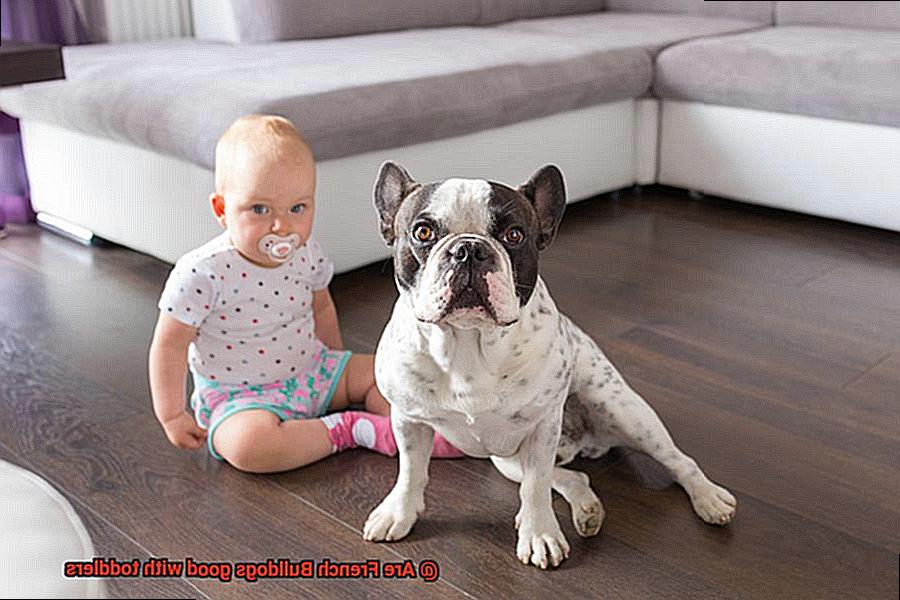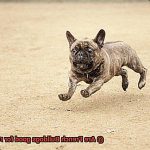Are French Bulldogs good with toddlers?
Got a burning question on your mind? Wondering if those adorable French Bulldogs are good with your pint-sized tornadoes? Well, you’re in the right place. In this blog post, we’re about to unravel the delightful dynamic between French Bulldogs and toddlers.
Picture this: squishy faces, bat-like ears, and personalities that could melt even the coldest of hearts. That’s right, we’re talking about those lovable French Bulldogs. But can they handle the chaos that comes with wrangling tiny humans? Let’s dive into their world and find out.
Get ready for an adventure as we explore the temperament and natural affinity of French Bulldogs towards toddlers. We’ll also dish out some handy tips on fostering a safe and loving bond between these cutie-patootie pups and your little adventurers. Spoiler alert: you might just witness an epic partnership in the making.
So, buckle up for this journey of discovery as we uncover whether French Bulldogs are truly the pawfect addition to your family dynamic. Get ready to have your heart melted by these furry friends – let’s go.
The Friendly Nature of French Bulldogs
Contents
- 1 The Friendly Nature of French Bulldogs
- 2 Are French Bulldogs Aggressive Towards Toddlers?
- 3 Benefits of Socialization and Training for French Bulldogs
- 4 Playful Companionship Between French Bulldogs and Toddlers
- 5 Safety Precautions When Allowing Dogs and Toddlers to Interact
- 6 Teaching Children Appropriate Behavior Around Dogs
- 7 Limitations of French Bulldogs With Toddlers
- 8 Setting Boundaries For Both the Dog and Child
- 9 Conclusion
Are you a proud owner of a French Bulldog and also have a curious toddler running around? Well, you’re in luck. French Bulldogs are known for their friendly nature and make fantastic companions for young children. Let’s explore why these lovable dogs are good with toddlers.
Calm and Gentle Demeanor
French Bulldogs have a calm and gentle demeanor, which is perfect for little ones. They are not hyperactive or aggressive, reducing the chances of unintentional harm during playtime. With their easygoing and adaptable nature, French Bulldogs can match the energy levels of toddlers without overwhelming them.
Socialization Skills
These furry friends thrive on human companionship and enjoy being part of a family. It’s important to introduce your French Bulldog to different people, including children, from an early age. This socialization helps them develop positive behaviors and become comfortable in various situations, making them great playmates for toddlers.
Patience and Tolerance
French Bulldogs are renowned for their patience and tolerance, even with the sometimes rough handling of toddlers. However, it’s crucial to remember that every dog has its limits. Supervision is key when young children interact with any dog breed, including French Bulldogs. Teaching both your child and dog appropriate behaviors will foster a safe and harmonious relationship.
Loyalty and Protective Instincts
Apart from their friendly nature, French Bulldogs are fiercely loyal and have protective instincts towards their loved ones. While they may not be considered guard dogs due to their small size, they will bark to alert you if they sense any potential danger. This instinct can provide reassurance for parents when it comes to the safety of their children.
Remember, each dog is unique, and individual temperament can vary. Take the time to understand your French Bulldog’s behavior before introducing them to your toddler. With proper training, socialization, and supervision, French Bulldogs can be the perfect companions for your little one – providing love, affection, and endless hours of play.
Are French Bulldogs Aggressive Towards Toddlers?
While French Bulldogs are generally known for their friendly and affectionate nature, it is important to understand that individual dog behavior can vary. In this article, we will delve into the importance of proper training, socialization, and supervision when introducing a French Bulldog to a toddler.
The Importance of Proper Training:
Just like any other breed, French Bulldogs require proper training to ensure they know how to behave around children. Starting from an early age, it is crucial to establish a strong foundation of training and positive reinforcement. This will help your French Bulldog understand boundaries and appropriate behavior when interacting with toddlers.
The Power of Socialization:
Proper socialization is key in preventing aggression issues. Introduce your French Bulldog to different environments, people, and situations from a young age. This will help them become comfortable and confident in various settings, including interactions with children.
Socialization also teaches them how to respond appropriately to different stimuli, reducing the likelihood of aggressive behavior towards toddlers.
Supervision: Safety First.
While French Bulldogs are generally good with toddlers, supervision is still essential. Toddlers may unknowingly engage in behaviors that can provoke or startle the dog.
It is crucial to monitor interactions between your French Bulldog and the toddler to ensure safety for both parties. Remember, accidents can happen even with the most well-behaved dogs.
Teaching Respectful Behavior:
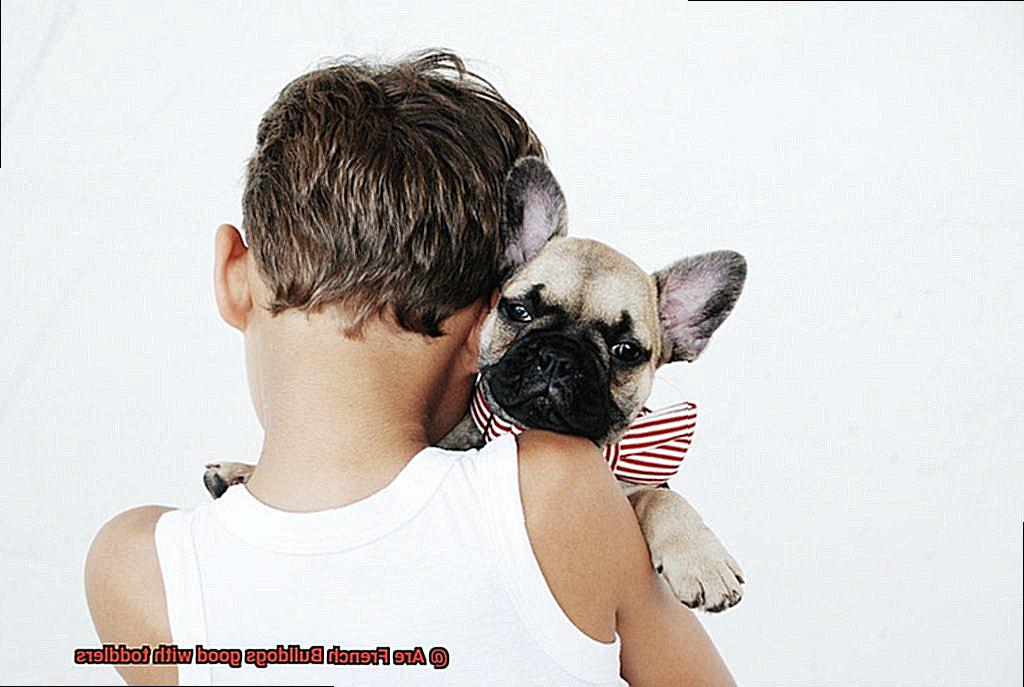
Parents play a vital role in teaching toddlers how to behave around dogs, including French Bulldogs. Teach your child not to pull on the dog’s ears or tail, climb on them, or engage in rough play. By treating dogs with respect and gentleness, you foster a positive relationship between your French Bulldog and your toddler.
Assessing Individual Temperament:
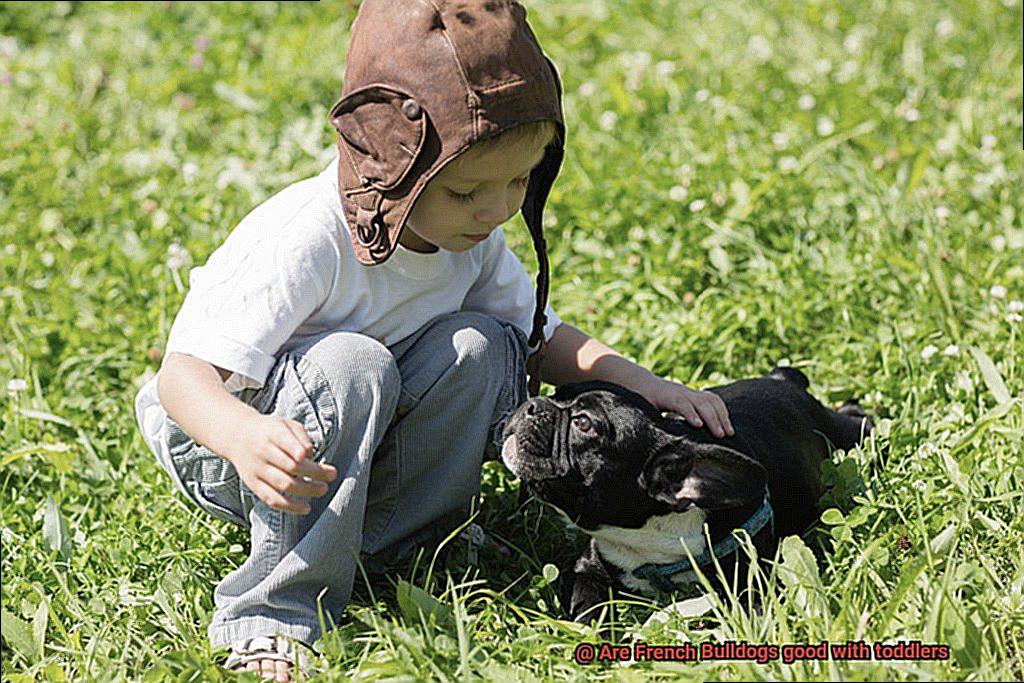
While French Bulldogs are generally good with toddlers, it’s important to remember that every dog is an individual. Some French Bulldogs may have a higher prey drive or may not be as tolerant as others. Take the time to assess your specific dog’s behavior and temperament to determine if they are suitable for a household with toddlers.
Seek Professional Help, If Needed:
If your French Bulldog displays signs of aggression towards toddlers or anyone else, seek professional help from a qualified dog trainer or behaviorist. They can assess the situation, identify any underlying issues, and provide guidance on how to address and manage the aggression. Remember, there’s no shame in seeking help when needed.
Benefits of Socialization and Training for French Bulldogs
French Bulldogs, known for their affectionate nature and playful personalities, can make wonderful family pets. However, to ensure a harmonious relationship between French Bulldogs and toddlers, it is essential to prioritize socialization and training.
In this article, we will explore the numerous benefits of socialization and training for French Bulldogs, providing insights and tips to help create a safe and enjoyable environment for both your furry friend and your little one.
Socialization: Shaping Well-Rounded Canine Citizens
Socialization is a crucial aspect of a French Bulldog’s development. By exposing them to various people, animals, and environments from a young age, we can help them become well-rounded and adaptable adults. This is especially important when it comes to introducing French Bulldogs to toddlers.
Early socialization helps them develop positive associations and behavior around young children, teaching them to be gentle, patient, and tolerant. As a result, they become excellent family companions.
Training: Building Communication and Safety
Training plays a vital role in establishing effective communication between French Bulldogs and toddlers. Basic obedience training teaches them to understand and follow commands such as “sit,” “stay,” and “come.” This not only ensures their safety around toddlers but also prevents any potential accidents or harm to the child. Additionally, training helps discourage unwanted behaviors like jumping, nipping, or excessive barking around toddlers.
Consistency and Positive Reinforcement: The Key Ingredients
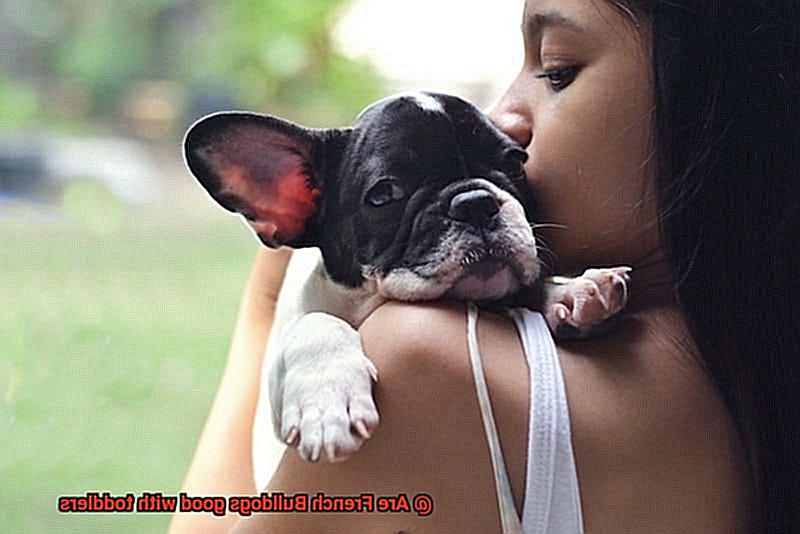
Consistency and positive reinforcement are key when training French Bulldogs. Reward-based methods using treats or praise can be highly effective in motivating their learning process. By consistently rewarding desired behaviors, we encourage them to repeat those behaviors in the future. This positive approach strengthens the bond between the dog and child while fostering a nurturing environment.
Early Start: The Sooner, the Better
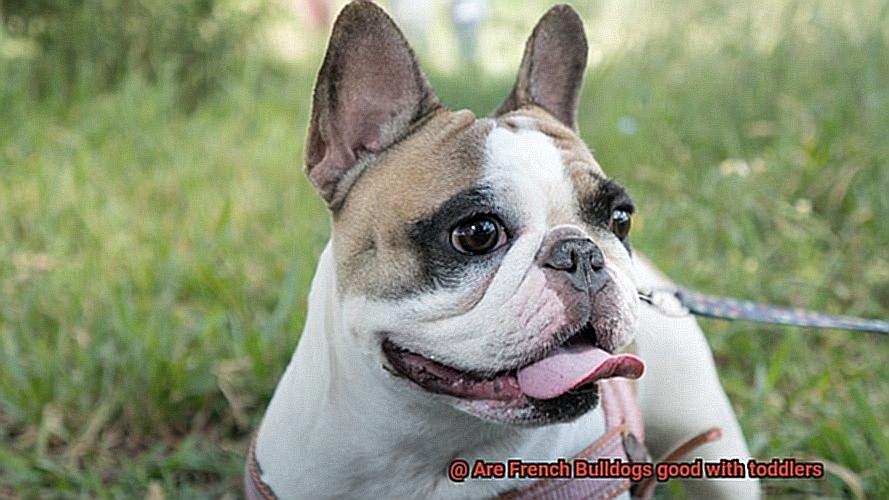
It is crucial to start socialization and training as early as possible, preferably when the French Bulldog is a puppy. However, it is never too late to begin training an older dog. With patience and dedication, you can still achieve positive outcomes. Professional trainers or obedience classes can provide guidance and structured learning environments, benefiting both the dog and the owner.
Playful Companionship Between French Bulldogs and Toddlers
French Bulldogs are known for their playful and affectionate nature, making them great companions for toddlers. Their gentle and patient demeanor, combined with their natural protective instincts, make them a suitable choice for families with young kids. In this section, we will explore the delightful bond between French Bulldogs and toddlers, offering tips on fostering a harmonious relationship between these two adorable creatures.
Why French Bulldogs are Perfect Playmates for Toddlers
- Tolerance: French Bulldogs have a remarkable tolerance for children’s playful antics. They can withstand a fair amount of poking, prodding, and even accidental tumbles without reacting aggressively.
- Affection: Toddlers often seek comfort and security from their furry friends. French Bulldogs provide just that with their loving and cuddly nature. They are always up for snuggles and will happily offer a warm lap for a tired toddler.
- Playfulness: Both French Bulldogs and toddlers have boundless energy and love to engage in playful activities. Whether it’s a game of fetch or chasing bubbles in the backyard, these two can keep each other entertained for hours.
Tips for Ensuring a Safe and Enjoyable Relationship
- Supervision: It is crucial to supervise interactions between French Bulldogs and toddlers to prevent any mishaps. Always be present when they are together to ensure the safety of both parties.
- Teach Appropriate Interactions: Toddlers should be taught how to interact appropriately with dogs. This includes not pulling on their ears or tail, respecting their personal space, and not disturbing them while eating or sleeping.
- Training: Just as toddlers need guidance, so do French Bulldogs. Basic obedience training is essential to teach them commands and boundaries around children. This will ensure that they understand how to behave appropriately in the presence of little ones.
- Exercise and Stimulation: Both French Bulldogs and toddlers require regular exercise and mental stimulation to maintain a healthy and balanced relationship. Engage in activities that cater to both their needs, such as going for walks or playing interactive games.
By fostering a playful companionship between French Bulldogs and toddlers, you are not only providing endless fun but also nurturing a bond that will last a lifetime. Remember to prioritize safety, teach appropriate interactions, and provide adequate exercise for both your furry friend and little one. With these tips in mind, get ready for countless hours of joy and laughter with your French Bulldog and toddler duo.
Safety Precautions When Allowing Dogs and Toddlers to Interact
Safety Precautions When Allowing French Bulldogs and Toddlers to Interact
Introduction:
French Bulldogs are known for their friendly and affectionate nature, making them great companions for toddlers. However, it is important to prioritize safety when allowing these two to interact. In this section, we will discuss some essential safety precautions that every French Bulldog owner should follow when their dog interacts with a toddler.
Always supervise interactions:
Accidents can occur in the blink of an eye, so it is crucial to have a responsible adult present at all times when your French Bulldog is interacting with a toddler. This supervision ensures that any potential issues can be addressed immediately, keeping both the dog and the child safe.
Teach appropriate behavior:
Both dogs and toddlers need to learn how to interact with each other appropriately. Teaching your French Bulldog basic obedience commands like “sit,” “stay,” and “leave it” establishes boundaries and helps them understand what is expected of them. Similarly, toddlers should be taught how to approach and handle dogs gently, avoiding behaviors like pulling on ears or tail.
Create a safe environment:
Ensure that the areas where your French Bulldog and toddler interact are free from potential hazards. Remove small objects that could pose choking hazards or tempt your dog to chew on them. Use baby gates or playpens to create separate spaces for the dog and the child, especially during unsupervised times.
Allow gradual introductions:
If you are introducing a new French Bulldog into a home with a toddler, take it slow and introduce them gradually. Start with short supervised interactions and gradually increase the duration as both the dog and toddler become more comfortable with each other. This gradual approach helps prevent overwhelming situations for either party.
Teach the toddler about unfamiliar dogs:
Even if your French Bulldog is good with toddlers, teach your child how to interact safely with unfamiliar dogs. Teach them to always ask permission from the dog’s owner before approaching, approach calmly and slowly, and avoid sudden movements or loud noises that may startle the dog.
Be mindful of warning signs:
Dogs communicate through body language, so it is crucial to be aware of any warning signs that your French Bulldog may exhibit. These can include growling, showing teeth, stiffening of the body, or a tense expression. If you notice any of these signs, immediately separate the dog and toddler and consult with a professional dog trainer or behaviorist.
Seek professional help if needed:
If you have any concerns about the interactions between your French Bulldog and toddler, don’t hesitate to seek professional help. A qualified dog trainer or behaviorist can provide guidance and training techniques specific to your situation, ensuring the safety and well-being of both your dog and toddler.
Teaching Children Appropriate Behavior Around Dogs
French Bulldogs are known for their friendly and gentle nature, making them a popular choice as family pets. However, it is crucial to teach children appropriate behavior around dogs to ensure the safety and well-being of both the child and the dog. Here are some tips to help you navigate this important aspect of raising a French Bulldog in a household with children.
- Dogs Have Feelings Too: Start by explaining to your child that dogs have feelings just like humans do. They can feel scared, hurt, or uncomfortable if they are treated roughly. By instilling empathy in your child, they will learn to approach dogs with kindness and respect.
- Always Ask for Permission: Teach your child to never approach a dog without permission from the owner, even if it is a familiar dog. This is especially important with French Bulldogs, as they can be sensitive to unexpected approaches. Encourage your child to always ask the owner if it is okay to pet the dog.
- Slow and Calm Approach: Show your child how to approach a French Bulldog slowly and calmly. Explain that it is important to let the dog sniff their hand first before attempting to pet them. This allows the dog to become familiar with their scent and helps create a positive interaction.
- Gentle Play: French Bulldogs enjoy gentle playtime with children. Encourage your child to use soft voices and avoid any rough or aggressive behavior. Teach them that pulling on a dog’s ears, tail, or fur can be painful for the dog and should never be done.
- Respect Personal Space: Dogs, including French Bulldogs, have their own personal space and boundaries. Teach your child to respect this by not disturbing the dog while it is eating or sleeping. These are times when dogs can become protective or territorial.
- Signs of Discomfort or Aggression: It is essential for children to understand the signs of discomfort or aggression in dogs. Teach your child to look for signs such as growling, baring teeth, or stiff body language. If a French Bulldog displays any of these signs, teach your child to back away slowly and give the dog space.
- Treat Dogs with Kindness: Finally, emphasize the importance of always treating dogs, including French Bulldogs, with kindness and compassion. Teach your child that just like any other living creature, dogs deserve to be treated well and loved.
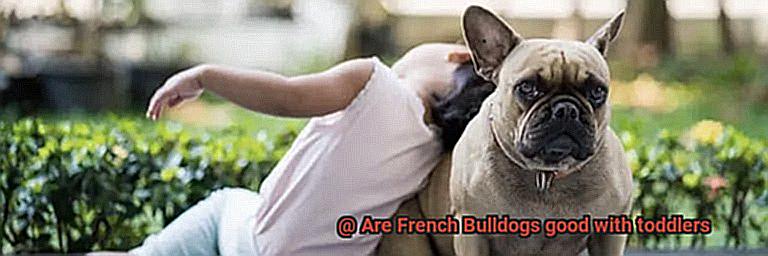
Limitations of French Bulldogs With Toddlers
Picture this: a playful French Bulldog and an energetic toddler, their laughter echoing through the house as they embark on adventures together. While French Bulldogs are known for their friendly nature and affectionate demeanor, it’s important to be aware of the limitations they may have when interacting with toddlers.
In this blog post, we’ll explore these limitations and provide tips on how to create a safe and enjoyable environment for both your French Bulldog and your little one.
Size and Strength:
French Bulldogs may be small in size, but they still possess some weight. As toddlers navigate their world, they can unintentionally be knocked over during play. To prevent any accidental bumps or falls, it’s crucial to supervise their interactions closely. Teach your child to approach the dog gently and avoid pulling on their ears or tail.
Energy Levels:
French Bulldogs are active dogs, but they can tire easily compared to toddlers who seem to have an endless supply of energy. Ensure that your French Bulldog gets regular exercise to meet their energy needs, enabling them to engage in playtime with your child without becoming overwhelmed or frustrated.
Health Issues:
Due to their short snouts, French Bulldogs may experience breathing difficulties, especially in hot weather or during physical activity. It’s important to monitor their breathing and provide them with breaks when needed. This will help prevent any potential health issues and ensure a safe play environment for both dog and child.
Stubbornness and Independence:
French Bulldogs are known for their stubborn streaks, which can make training them to interact appropriately with toddlers a bit challenging. Consistency in training is key, along with positive reinforcement techniques. Encourage your child to use clear commands and reward good behavior with treats or praise. This will foster a mutual understanding between your French Bulldog and your toddler.
Prey Drive:
French Bulldogs have a strong natural instinct to chase small animals or objects. This can be a concern if you have small pets or if your toddler has toys that resemble small animals. To prevent accidents or injuries, keep small pets away from the dog’s reach and ensure that your toddler’s toys are safely stored when not in use.
Setting Boundaries For Both the Dog and Child
Creating a safe and harmonious relationship between your French Bulldog and toddler requires setting clear boundaries for both parties involved. By establishing these boundaries, you can ensure that both the dog and child understand how to interact with each other in a respectful and appropriate manner. Here are some tips on setting boundaries for both the French Bulldog and toddler:
Establishing Boundaries for the French Bulldog:
- Designate certain areas of the house as off-limits for the dog, such as the child’s bedroom or play area. Use baby gates or close doors to restrict access.
- Teach the dog basic obedience commands like “sit,” “stay,” and “leave it.” This will help them understand what is expected of them in different situations.
- Be consistent in enforcing rules and boundaries. Ensure that all family members are on board and follow the same set of rules to avoid confusion.
Teaching Boundaries to the Toddler:
- Teach your child how to interact with the dog appropriately. This includes not pulling on their ears or tail, poking their eyes, or engaging in rough play that could potentially harm the dog.
- Always supervise interactions between the dog and toddler. An adult should be present to ensure that both parties are behaving appropriately and intervene if necessary.
- Teach your child to respect the dog’s personal space. They should understand that the dog may need alone time and should not bother them when they are eating or sleeping.
Positive Reinforcement:
Remember that every dog and child is unique, so it’s important to adapt these strategies based on their individual personalities and needs. If either the dog or child consistently struggles with respecting boundaries, seeking professional help from a dog trainer or behaviorist can provide guidance and support.
YgCJuFTs_aU” >
Conclusion
In conclusion, French Bulldogs are indeed a great choice for families with toddlers.
Their gentle and affectionate nature makes them excellent companions for young children. With proper training and socialization, French Bulldogs can develop a strong bond with their little human counterparts.
Their small size also makes them less intimidating and more manageable for toddlers to interact with. Additionally, French Bulldogs have a patient and tolerant temperament, which allows them to tolerate the occasional rough play or accidental tugging from a curious toddler.
It is crucial to always supervise interactions between French Bulldogs and toddlers to ensure the safety of both parties.
